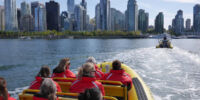
Details from the BC Government Release below:
On May 4, 2021 the Province announced investment into 11 destination development and management projects that will are underway in the Vancouver, Coast & Mountains (VCM) tourism region. The Targeted Regional Tourism Development Initiative (TRTDI) is one of three investment programs for tourism as part of StrongerBC: BC’s Economic Recovery Plan, and seeks to create employment opportunities, attract new tourism related businesses, disperse visitors and residents throughout the region and increase economic diversification within communities.
The TRTDI projects underway in the VCM region include developing public outdoor instalments in the Metro Vancouver area to animate gathering spaces, investing in the Experience the Fraser project, and developing an agritourism journey through Pemberton, Lillooet and the Bridge River Valley. The Province has provided $2.1 million towards these projects, and others, in the region.
Destination BC, representing VCM, in partnership with community destination management organizations, local and regional governments, provincial ministries, First Nations, non-profits, and other partners have worked together to identify initiatives that will enhance the region’s tourism amenities and experiences. This week’s project highlight is:
Island Coastal Economic Trust Small Capital Fund
The Island Coastal Economic Trust Small Capital Fund initiative and partnership will provide an opportunity for local governments, tourism, arts and culture organizations and businesses to address declining downtown/main street business district area activity by creating revitalization approaches through capital improvements to drive new vitality into these areas. The funding will focus on new, innovative, concept-driven initiatives that foster increased commercial activity, visitor attraction, and resident engagement. A range of infrastructure will be considered to support new uses of public spaces in downtown and main street areas. This initiative will benefit both residents and visitors as we work to achieve long-term recovery for the tourism industry in the VCM region.
In total, British Columbia’s six tourism regions have received $13.6 million for 53 tourism projects. The approved projects must be completed by March 2023. View the master list of all TRTDI projects underway throughout the province.
Past week project highlights:
Visitor Amenities on Trails in the Sunshine Coast
In an effort to support development of visitor amenities on Sunshine Coast destination trails, this initiative will build amenities such as wayfinding, washrooms, bear caches, and signage on southern trails in order to enhance the visitor experience. The Sunshine Coast is known for its destination trails from wide, accessible paths through established provincial parks to narrow single tracks through the forest. The purposed amenities will positively impact the overall trail experience and be an incentive for visitors to add them to their Sunshine Coast to visit list. This initiative is being led by Sunshine Coast Tourism and was identified in the Sunshine Coast Destination Development Strategy as a priority.
Sunshine Coast Highway Point of Interest
The Sunshine Coast Highway Point of Interest initiative will develop and or enhance one scenic lookout along the popular Coastal Circle Route – Highway 101 on the Sunshine Coast. The Sunshine Coast Destination Development Strategy identifies the need to create more stops along the route, to encourage visitors to get out of their cars, rather than driving the 130 kilometer route straight through. The scenic lookout will be equipped with garbage can(s), picnic table(s), and a shelter including signage and a story of the place. This initiative was identified in the Sunshine Coast Destination Development Strategy as a priority and is being led by Sunshine Coast Tourism.
Agri-tourism signage for Lillooet, Bridge River Valley and Pemberton Valley
In an effort to raise awareness of Pemberton’s farming community and agri-tourism experiences, this initiative will provide wayfinding signage for three visitor experiences including: Pemberton Farm Tour, a self-guided driving tour of local farm stands and farming businesses open seasonally or year-round; Slow Food Cycle, a one-day, annual cycling event celebrating local food, farmers, and the joys of biking along 40 km of Pemberton Meadows Road; and the Range Beyond Range Circular Route, a scenic 290 km off-road circular driving route that connects Pemberton, Lillooet, and the Bridge River Valley. Along with raising awareness of the agri-tourism experiences in this part of the region this project will aim to strengthen community connections. The agri-tourism signage initiative is being led by Tourism Pemberton and was identified in the Sea to Sky Corridor Destination Development Strategy as a priority.
Destination Education
The Vancouver, Coast & Mountains Destination Education Initiative will develop and deliver communication initiatives aimed at ensuring visitors and residents alike understand the shared values of the communities in BC. This initiative builds on the Destination Education work already being done in the Sea-to-Sky corridor which is focused on educating residents and visitors on how to travel and recreate responsibly. You can find this work on creating responsible user management processes through targeted communications, marketing, research, and signage outlined in the Vancouver, Coast & Mountains Destination Development Strategy. The objective outlined here reads: Improve visitor education and communication related to instilling a sense of pride of place for residents and help educate visitors on respectful behaviour and responsibility in natural environments. This education piece feeds directly into Destination Stewardship, which we encourage you to read more about in the VCM Strategy.
Experience the Fraser
Experience the Fraser is a recreational, cultural, and heritage project that extends along the Lower Fraser River Corridor connecting Hope to the Salish Sea. Over 550 km of trails, through the Coast to Canyon Trail and related community trails feeding off of this trail, and blueways will connect communities and First Nations along the Fraser River. The targeted regional tourism development funding will specifically support implementing additional infrastructure project works identified in the jointly developed concept plan by the Province of BC, the Fraser Valley Regional District and the Metro Vancouver Regional District. The project will build upon the already existing inventory of information and wayfinding signage, benches, trails, community storytelling, enhancement of existing waterfront space, and potentially connecting portions of trail. This project depends upon the coordination of two regional districts, over 25 municipalities, over 15 First Nations communities, a federal ministry, multiple contractors, and multiple provincial ministries. The Experience the Fraser Initiative was identified in the Fraser Valley and the Metro Vancouver Destination Development Strategies. Learn more on the VCM Destination Development page.
Indigenous Cultural Kiosks
The Indigenous Cultural Journey Kiosks initiative will extend the journey kiosks and rest areas that were built for the 2010 Vancouver Olympics. Up to four new kiosk locations will be selected including 2 North of Whistler and 2 in the Fraser Valley. These kiosks will be located at accessible pullouts along the route where you can stop and learn about the diverse culture of the Indigenous Nations in that area. The kiosks are a way to connect people and communities along the route by highlighting key landmarks to stop at. This initiative was identified in both the Fraser Valley and Sea to Sky Destination Development Strategies as a priority. Indigenous Tourism British Columbia will lead the project with support from the Vancouver, Coast & Mountains team.
Metro Vancouver Public Space
The Metro Vancouver public space activation initiative will create experiences aimed at enhancing public spaces by making our communities more welcoming and inclusive. The installations will be located in public squares, parks, or connecting spaces within communities and open to all visitors and residents. Public spaces fill an important role in connecting residents, visitors and building community pride and purpose. An example of public space activation is urban street features that offer unique places to gather outdoors. Public space activation is an initiative that was identified in the Metro Vancouver Destination Development Strategy as a key way to build community.
Read the full release: https://news.gov.bc.ca/releases/2021TACS0036-000825
Media Contact:
Ministry of Tourism, Arts, Culture and Sport
Government Communications and Public Engagement
250 208-4309





